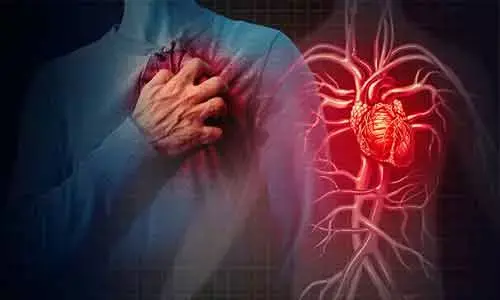- Home
- Medical news & Guidelines
- Anesthesiology
- Cardiology and CTVS
- Critical Care
- Dentistry
- Dermatology
- Diabetes and Endocrinology
- ENT
- Gastroenterology
- Medicine
- Nephrology
- Neurology
- Obstretics-Gynaecology
- Oncology
- Ophthalmology
- Orthopaedics
- Pediatrics-Neonatology
- Psychiatry
- Pulmonology
- Radiology
- Surgery
- Urology
- Laboratory Medicine
- Diet
- Nursing
- Paramedical
- Physiotherapy
- Health news
- Fact Check
- Bone Health Fact Check
- Brain Health Fact Check
- Cancer Related Fact Check
- Child Care Fact Check
- Dental and oral health fact check
- Diabetes and metabolic health fact check
- Diet and Nutrition Fact Check
- Eye and ENT Care Fact Check
- Fitness fact check
- Gut health fact check
- Heart health fact check
- Kidney health fact check
- Medical education fact check
- Men's health fact check
- Respiratory fact check
- Skin and hair care fact check
- Vaccine and Immunization fact check
- Women's health fact check
- AYUSH
- State News
- Andaman and Nicobar Islands
- Andhra Pradesh
- Arunachal Pradesh
- Assam
- Bihar
- Chandigarh
- Chattisgarh
- Dadra and Nagar Haveli
- Daman and Diu
- Delhi
- Goa
- Gujarat
- Haryana
- Himachal Pradesh
- Jammu & Kashmir
- Jharkhand
- Karnataka
- Kerala
- Ladakh
- Lakshadweep
- Madhya Pradesh
- Maharashtra
- Manipur
- Meghalaya
- Mizoram
- Nagaland
- Odisha
- Puducherry
- Punjab
- Rajasthan
- Sikkim
- Tamil Nadu
- Telangana
- Tripura
- Uttar Pradesh
- Uttrakhand
- West Bengal
- Medical Education
- Industry
Antioxidant drug may reverse Atherosclerosis and prevent heart attacks and strokes: Study

Atherosclerosis is the build-up of fatty deposits in the arteries. When LDL cholesterol becomes oxidised and builds up to form plaques in the artery walls, inflammation and damage increase which can cause the plaques to rupture and cause blood to clot.
Professor David Leake and his team have found that an antioxidant drug, cysteamine stops oxidation of LDL cholesterol by accumulating in the lysosomes. This may reverse atherosclerosis and may help prevent heart attacks and strokes due to clots.
The study has been published in JAHA: Journal of the American Heart Association.
The drug is found to be safe in humans where it has already been used to treat a rare lysosomal disease called cystinosis.
Previously, researchers at the University of Reading discovered that LDL cholesterol can be oxidised in acidic small 'bags' called lysosomes in immune cells within the artery wall.
When the researchers looked at mice with atherosclerosis, those treated with cysteamine had a 32 to 56 per cent reduction in the size of atherosclerotic plaques depending on the part of the aorta – the largest artery in the body – that was examined.
Cysteamine decreased the amount of oxidised fat by 73 per cent and increased the stability of the atherosclerotic areas. It decreased the proportion of inflammatory white blood cells by 55 per cent and increased the area made up of smooth muscle cells by 85 per cent, ultimately reducing the chance of plaques rupturing and causing a blood clot.
Antioxidant drugs that have previously produced promising results in mice have proven disappointing in clinical trials to treat cardiovascular disease, but the researchers hope that with these promising results, cysteamine will prove a successful treatment in humans.
Professor David Leake, BHF-funded researcher who led the study at the University of Reading, said:
"The potential in this drug to protect against heart attacks and strokes and ultimately save lives superseded our expectations. We hoped it would cause plaques to grow at a slower pace, but we were amazed to find it reversed the process.
"Cysteamine would offer an entirely new way of treating atherosclerosis. We now want to look at the most efficient way to give this drug to patients, and hope that it can be taken to clinical trials in the next few years."
Professor James Leiper, Associate Medical Director at the British Heart Foundation, which funded the research said:
"Heart attacks and strokes threaten the lives of people too often. In the UK, every 5 minutes someone is admitted to hospital with a heart attack, and the same is true of stroke. "The more ways we can find to treat the root cause of cardiovascular disease, the more lives and livelihoods that can be saved.
"If this antioxidant drug can show the same promising effects in humans, then it could offer a lifeline to thousands of people in the future."
https://www.ahajournals.org/doi/10.1161/JAHA.120.017524
Hina Zahid Joined Medical Dialogue in 2017 with a passion to work as a Reporter. She coordinates with various national and international journals and association and covers all the stories related to Medical guidelines, Medical Journals, rare medical surgeries as well as all the updates in the medical field. Email: editorial@medicaldialogues.in. Contact no. 011-43720751
Dr Kamal Kant Kohli-MBBS, DTCD- a chest specialist with more than 30 years of practice and a flair for writing clinical articles, Dr Kamal Kant Kohli joined Medical Dialogues as a Chief Editor of Medical News. Besides writing articles, as an editor, he proofreads and verifies all the medical content published on Medical Dialogues including those coming from journals, studies,medical conferences,guidelines etc. Email: drkohli@medicaldialogues.in. Contact no. 011-43720751


